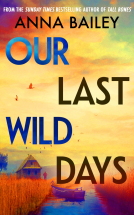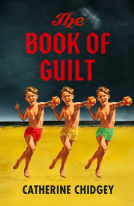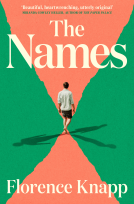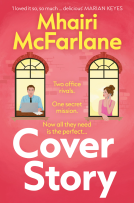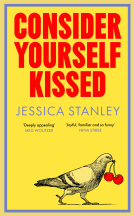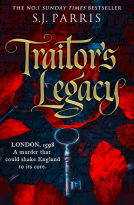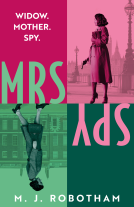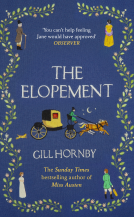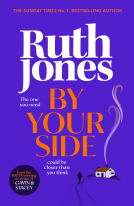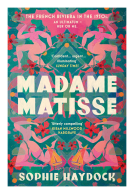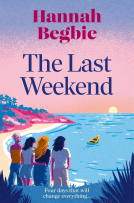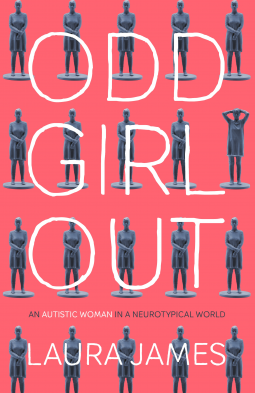
Odd Girl Out
An Autistic Woman in a Neurotypical World
by Laura James
This title was previously available on NetGalley and is now archived.
Send NetGalley books directly to your Kindle or Kindle app
1
To read on a Kindle or Kindle app, please add kindle@netgalley.com as an approved email address to receive files in your Amazon account. Click here for step-by-step instructions.
2
Also find your Kindle email address within your Amazon account, and enter it here.
Pub Date 6 Apr 2017 | Archive Date 4 Apr 2018
Pan Macmillan | Bluebird
Description
What do you do when you wake up in your mid-forties and realize you've been living a lie your whole life? Do you tell? Or do you keep it to yourself?
Laura James found out that she was autistic as an adult, after she had forged a career for herself, married twice and raised four children. Odd Girl Out tracks the year of Laura's life after she receives a definitive diagnosis from her doctor, as she learns that 'different' doesn't need to mean 'less' and how there is a place for all of us, and it's never too late to find it.
Laura draws on her professional and personal experiences and reflects on her life in the light of her diagnosis, which for her explains some of her differences; why, as a child, she felt happier spinning in circles than standing still and why she has always found it difficult to work in places with a lot of ambient noise.
Although this is a personal story, the book has a wider focus too, exploring reasons for the lower rate of diagnosed autism in women and a wide range of topics including eating disorders and autism, marriage and motherhood.
This memoir gives a timely account from a woman negotiating the autistic spectrum, from a poignant and personal perspective.
Available Editions
| EDITION | Hardcover |
| ISBN | 9781509843060 |
| PRICE | £16.99 (GBP) |
| PAGES | 320 |
Featured Reviews
Laura James was an ordinary woman - married, four children, successful career. But then she was diagnosed as having Asperger's Syndrome. Odd Girl Out is in parts memoir as she looks back on her life and re-examines how her long unnoticed autism has stalked her along the way, but the book is also an attempt to understand better what it means to be on the autistic spectrum. Female memoirs have become increasingly common in recent years but James engages with her subject with a great deal of intelligence and with a clear desire to look not for sympathy but for solutions, not for a cure but for improved consideration. No matter one's relationship to autism, whether or not one is within the spectrum, James' perspective is an interesting one and well worth the heeding.
For me, Odd Girl Out was an at times difficult read. There is autism on both sides of my family, I have tested positively for dyspraxia and the evidence does suggest that if I tried, I could probably add Asperger's to my own medical curriculum vitae. Like James though, I got through school and university without anybody ever suggesting there as a reason behind my social difficulties, chronic lack of coordination and the way that I could find apparently simple situations utterly over-whelming. It is strange to me when I am told now that I must be wrong, that I cannot be autistic because I am so apparently normal. Flash back fifteen years and my schoolmates would have been very quick to point out that, like James, I was the odd girl out.
While depictions of autism have become comparatively mainstream - Rainman and Christopher from The Curious Incident have broken a lot of ground here - it is still considered by many to be a very male condition. The female experience is far less well understood. Via interviews with various different experts in the field, James explains how autistic girls are less likely to stand out as they will try harder to conform than their male counterparts. Thus, the autistic boy may be running round and doing his own thing, while the autistic girl tries - and often fails - to mimic the behaviour of her peers. This rings a great deal of bells for me.
Receiving her diagnosis in her forties, James attempts to achieve some kind of closure. On the one hand, it is heartening to receive the news, the 'vindication' that one is not 'mad, bad or sad', but rather 'differently wired'. As James describes it, for those on the spectrum, their 'experience of the world is at odds with how most other people see it.' But then at the same time it is easy to fixate on the label, to allow it to explain away everything. To the point where every quirk of one's personality can come to seem like a symptom rather than a personal characteristic.
As James explores the condition, she ponders the various troubling statistics such as the one that 87% of autistic people are unemployed and that those with the condition have a lower life expectancy. And then realises that she is carrying out a classic autistic 'info dump' and pauses to take stock. The stand-out phrase for me in the book was 'Fear is the main emotion of autism'. She captures vividly how new experiences can seem overwhelming, the fear about saying the wrong thing, doing the wrong thing, doing something to mark oneself as 'odd'.
I felt a recognition too of James' description of the hell that was secondary education - while teenage girls often let their claws come out, 'Aspie girls don't play that game'. It's so true - when social rules are not so innate, when you are learning as you go, you know only to follow the rules rather than flout them. As a teenager, I remember how confusing it was that the girl who shared my desk during Maths, who was so was nice and always picked up my textbook for me, could then be so horrible to me during PE. I would love to say that all that was a problem confined to adolescence, but it is not. These confusing people follow us into the world of work, they are the colleagues who smile, offer cups of tea, then lie, cover their own backs and leave you in the lurch. I have a long history of being too trusting and when someone who has been nice to me even once is downright rude or deceitful, I am always astounding. It would be easier if they were always unpleasant, but the gear shift between acceptable and unacceptable behaviour leaves me reeling.
As James points out, despite popular belief, those on the spectrum are often only too capable of sensing the emotions of others, indeed it is this which can often be the most challenging to process. When I look back over my childhood, I can see so many incidents that mark out that I was not neurotypical - I had overpowering terrors about unfamiliar food, I would cry if someone tried to make me wear dresses or skirts and I found social engagement almost impossible. Being too tired or too hungry or too hot often triggered emotional meltdowns which made sense to no one, least of all myself. Even as an adult, if 'obsessive interests' are classic markers of autism, I think that keeping a book review website for six years and publishing 1,500 posts does rather qualify.
I feel I have spent my whole life dismissing my difficulties and overcoming them, but reading Odd Girl Out made me realise that all of this has required a huge amount of effort. It is true that no matter where exactly I sit on the spectrum, it has not disabled me. But it has made things more difficult. As James points out though, girls on the spectrum can often seem as though they are not only failing to integrate with their peers, but also failing to fit the classic profile of autism. Telling a girl that she does not 'seem' autistic does not take into account what her experience of daily life might be, but rather judges her by the male template of autism. We are all different and as Odd Girl Out explains, we talk about the spectrum 'not because it is linear but because any factor can be present at any point'. So I can learn to 'pass' socially, to knit, to drive my car or any of the other things that were once mountains to be climbed, but then feel very bothered because I forgot to get apples on the way home so that the next day I won't have the 'right' type of fruit with my lunch.
But then on the other hand, as the daughter of a single parent, I also padded about obediently after my mother wherever we were going, carrying my back pack full of colouring materials and books - I could be trusted to sit quietly and get on with things. Not all children are capable of that. I made it all the way through school and university and got the grades I needed. Where I sit on the spectrum is not the whole story. I have a number of friendships that have lasted over a decade, I have sustained a lengthy relationship - a number of people who are under no obligation to do so have chosen to maintain ties with me. And maybe I'm a blogger because I like writing and books.
Odd Girl Out feels like a timely examination of the female experience of autism. Its main message though is not just for those directly affected by Asperger's, but also for those around them. James comes to terms with her diagnosis - and what a horrible word that is. Years ago, I used to volunteer at an after school club and I remember the main supervisor was away one day and a substitute came and as she entered the room, she saw a boy rolling on the floor and asked me with a curled lip, 'Does he have a diagnosis?' She asked that same question about a number of the children and my hackles raised each time. These children did not deserved to be dismissed with diagnoses, but rather engaged with as people - are we seriously saying that it is ok to dismiss someone's personality as a condition? The same is true when we get older. James considers how she would treat someone else with that condition and concludes that it would be best to behave 'very, very kindly' and reading that, I realised that is the best way that I can behave towards myself too.
It is easy to become frustrated, irate even that apparently simple situations prove too much, but it is not kind. It is not the way to treat yourself. Nor is it the way to treat anyone else. We cannot know what other people are carrying with them through life so we would be best advised to be very, very kind. Odd Girl Out is a quiet memoir in many ways, but when I reached the end, I could not help but judge it a celebration, an articulate expression of the courage and perseverance needed to make it through a world slanted towards the neurotypical. It hurts none of us to take a pause and try to make things go a little easier for our fellow travellers on the road.
I have reviewed the book on my blog. A useful addition to the literature and a good read for women with autism or their relatives.
 Philipa C, Reviewer
Philipa C, Reviewer
Now out in paperback this book which was published last year followed an article in the Daily Telegraph in which Laura discussed her diagnosis of autism at the age of 45.
The book begins in 2015 with Laura on holiday with her husband Tim at a hotel in France. She opens a report on her ipad which informs her she has been diagnosed on the Autistic Spectrum Disorder with Adult Asperger's alongside medical conditions EDS (Ehlers Danlos Syndrom - which affects her joints making them disloate and also POTS (Postural Orthostatic Tachycardia) where high and persistent increases affect her heart rate when she is standing.
Her husband Tim comments " I'm worried that you'll become your diagnosis. "They have been married for 20 years and have two sons. Tim has suffered from clinical depression, autism may be hereditary and one son Jack has also been diagnosed with ADHD.
Are we all autistic?
Reading Laura's account which traces her early adoption, young first marriage with two daughters and rehab for Lorazepam addiction might emphasize that a culmination of incidents - nature and nurture could have caused autism but other traits and obsessions (or special interests for those with autism) such as "In a good week I can read at least four books," says Laura (well I can sometimes read more including hers. and strange feelings about people and situations (noises, colours, foods) can also affect us - non autistic people ASPIES are non apparently as NEUROTYPICALS.
Now I don't want to undermine Laura's revealing and sensitive way of exploring her diagnosis and her life but there is a whole industry around autism today. When I was at school I knew no one with autism, or perhaps it wasn't diagnosed as such then. I also trained as a nurse for people with learning disabilities (known then as mental handicap) and did see autism, often in special schools and with often disturbing violent, non verbal and disruptive symptoms.
It is fantastic that children can be diagnosed earlier. However, resources and funding especially in a school situation often prevents suitable treatment and education for children with autism.
Laura is articulate, has access to the media and is financially able to investigate therapy, autism experts (Tony Attwood gets a lot of mentions) and treatments that many families may be excluded from because of their class or finance.
I totally admire her story and am aware its publicity last year enabled a lot of people to open up about their fears about how 'they felt or behaved'.
At one point in the book Laura says, "I can't name my feelings." I am glad she can now name them as autism but whether this will make her and her husband and children have a deeper understanding or happiness in their lives - of that I'm not totally convinced.
This book gives such a unique and revealing look in to the life of an adult diagnosed with autism. It is a biographical account of life both pre and post diagnosis; a look at the poignant and often difficult life events and transitions . It is also a champion of what is achievable and admirably unique about both being an Aspie and a female on the spectrum, but I think also explores what it is to be human,: imperfect, flawed, quirky, introvert, sensitive, perplexed, yet seeking to be accepted, loved, despite the above. Interlaced with quite detailed research from leading authorities within the field of ASD and other authors' perspectives on life, you're lead by the hand through a familiar but equally mystifying landscape of emotions and experience. With touching realism, and identifiable vulnerability this book really grabs and holds on to you.
 Ruth M, Reviewer
Ruth M, Reviewer
I downloaded this book under the impression it was fiction, as I rarely read anything else. Yet it gripped me right from the start, for the courage it must have taken to write an account of such searing honesty as well as the understanding it gave me of several people in my life.
This is the story of a woman who has never fitted in, who has been different all her life. After a lifetime of underperforming academically, difficult relationships, struggling to cope with things most of us take in our stride, and feeling like an outsider all the time, in her mid-40s she receives a diagnosis of autism spectrum disorder. This is the story of the year immediately following the diagnosis, as she and her husband come to terms with what it explains retrospectively and what it means to each of them singly and to them as a couple going forward.
For the lay person, who will almost certainly have encountered one or more people on the autism spectrum disorder, this account explains a huge amount that would otherwise make little sense. Things like sensory overload, the hugely different emotional responses, difficulties in reading social situations, the ability to border on being obsessive-compulsive in some areas of life whilst putting up with utter chaos in others, what can trigger an emotional and communication meltdown - all these are situations I and other non-ASD persons will have encountered in friends, colleagues, family, but failed to understand, respect, and accommodate.
Lara James’ journey through childhood and adulthood has been an incredibly fraught one, and one she has negotiated successfully, whatever she may have thought about it during her lower points. She has a job in media, a husband who has been around for 20 years in spite of his own problems with clinical depression, four children who seem to adore her, and, post-diagnosis, the insight to realise she must stop trying to fit in with a world completely unlike her. Instead, she will go forward as herself and take her place on her own terms. I salute her courage, thank her for putting this out here for the rest of us, and wish her a happy and fulfilling future.
 Emma P, Reviewer
Emma P, Reviewer
When I was invited to review this book, I was so delighted. This is such an important book and will help so many people; not only people on the spectrum, but those who work with them, diagnose them, and for anyone who would like to understand Autism better.
It is a very readable, well written book. As we read about the author’s life, we see her perspective on life, the daily challenges she faces, and her coping mechanisms. How she deals with her feelings, how she works her relationships and how she copes with day to day life, gives us such a great insight into ASD.
I love the way she highlights some really important issues; the way Autism presents differently in girls, which can make it difficult to diagnose, and the importance of valuing people that are on the spectrum. The way they think, and their creativity are so valuable to society. We can help people with Autism to cope better with the neurotypical world, but we shouldn’t try to change them to fit into our idea of what is normal. They are all important and valuable to us.
For myself, I work with children with special needs, and have worked with several children with ASD. I found that this book gave me such an insight into how it actually feels for them, and how we can make our neurotypical world an easier place for them to negotiate.
But don’t think that this book is just for professionals, or someone with a specific interest in Autism. I really believe that everyone should read it, that anyone would benefit from the understanding that it gives. But above all else, it is a very readable book, a lovely and fascinating account of someone’s life. Highly recommended.


